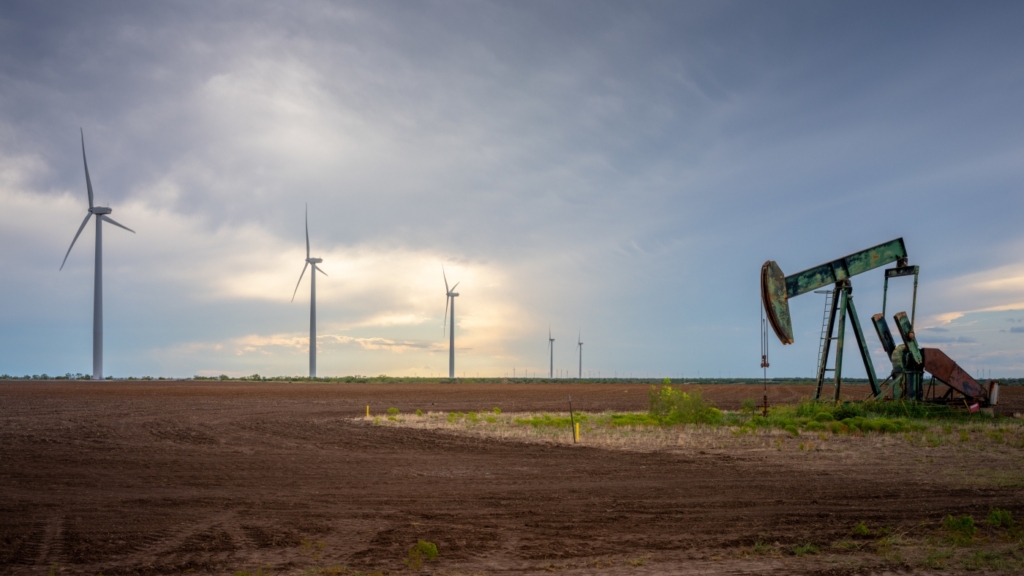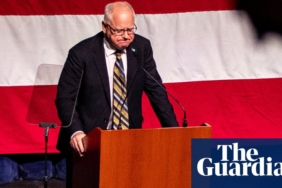An oil pumpjack is seen near a field of wind turbines in October 2023 in Nolan, Texas. The U.S. oil industry is headed towards a record-breaking year; renewable energy has also set several records this year. Prominent Republicans, including several in President-elect Donald Trump’s circle, are talking about an “all-of-the-above” approach to energy that supports fossil fuel and clean energy.
Brandon Bell/Getty Images
hide caption
toggle caption
Brandon Bell/Getty Images
President-elect Donald Trump talks a lot about “unleashing American energy” — specifically oil, which he likes to call “liquid gold.”
And based on his nominees for key energy posts, there’s every indication that a Trump administration 2.0 will actively promote oil and natural gas.
But another phrase is popping up a lot right now in Republican circles: “All of the above.” Trump’s pick for “energy czar,” who has a history of supporting both oil and renewables, has been described as an “all-of-the-above energy governor.” A key Republican in Congress hopes that Chris Wright, Trump’s choice to be the new secretary of energy and a believer in fracking, nuclear and geothermal energy, will support “an all-of-the-above energy policy.” Statement after statement, story after story. Even the summer before the election, the phrase was reportedly the talk of the Republican National Convention.
It’s shorthand for a set of policies that support oil and natural gas — and simultaneously, every other form of domestic energy, including solar, wind, geothermal and nuclear. The phrase has been around for decades. It appears to have been first promoted by the fossil fuel lobby before being embraced by a Democratic president, Barack Obama. For Obama, the phrase meant supporting natural gas and pursuing cheap gasoline while also investing in renewable power. Today, it’s a mainstream Republican position on energy.
President Biden, some argue, also supported “all of the above” in practice — although he didn’t use the phrase. But he only supported it in the near term. For the long term, he promoted green energy instead of fossil fuels, talking about a “clean energy transformation” that would remake the economy and address the climate crisis by gradually phasing out oil.
In contrast, the version of “all of the above” being talked about in conservative circles today asserts that oil is here to stay — but it leaves room for cleaner energy, too.
Trump can influence, but not dictate, oil production
Wall Street might not want to ‘drill, baby, drill’ as much as Trump
Trump has promised to “drill, baby, drill,” but presidents in the U.S. don’t dictate oil production. They can try to influence it, but market forces still dominate companies’ decision-making. Case in point: Biden tried to accelerate the shift from fossil fuels, but under his administration U.S. oil production hit new record highs.
The American Petroleum Institute has presented Trump with a policy wish list for the industry, including many things that the president-elect has promised to do, like rolling back incentives for producing and buying electric vehicles, restarting permitting for liquid natural gas exports, opening up more land for drilling for oil, and repealing or relaxing environmental regulations.
Those changes might make it easier and cheaper, and therefore more profitable, to drill for oil. But they won’t guarantee a massive increase in production. After all, U.S. production is already historically high. Global oil demand is far from booming. In fact, the oil cartel OPEC and its allies just delayed plans to boost production, judging that the world doesn’t need more oil at the moment. After all, if production suddenly surges beyond what global markets demand, prices would fall — which would, in turn, cause companies to pull back on drilling.
That’s a scenario investors and executives are eager to avoid. Wall Street has spent several years pressuring companies to focus less on “drill, baby, drill,” and more on a strategy you might call “dollars, baby, dollars” — sending spare cash back to stockholders, instead of deploying as many rigs as possible.
So, with financial incentives to keep production growth in check, how much would production increase if Trump enacts these oil-friendly policies?
In an interview with NPR, Thomas Pyle, who runs a think tank supporting free-market energy policy and was part of Trump’s transition team in his first administration, rejected the question entirely.
“I don’t know and I don’t care,” he said. “The industry should make those decisions based on the marketplace. … To me, it’s not about producing more. It’s about giving the industry the ability to make those choices free from the hammer of the regulations.”
Homegrown energy (and, shh, it’s clean)
Trump promised to boost oil and gas. But what do other Republicans think?
The Biden administration just spent four years offering billions of dollars in federal support to the clean energy industry, as part of an effort to slash U.S. carbon emissions and help curb the most catastrophic effects of climate change.
Meanwhile, Trump dismisses climate change as a hoax. Suffice to say that “clean energy” or “green energy,” defined by its climate benefits, won’t be a priority for the administration.
But under a different name, the same climate-friendly energy technologies might still thrive. That’s because alternative energy sources have other selling points for a Republican administration: They’re domestic, which keeps the U.S. less dependent on foreign imports. They support jobs. And wind and solar, in particular, are also now huge industries in states with Republican governments, like Texas, Oklahoma and North Dakota, which has shifted some of the politics around their support.
Kennedy Nickerson focuses on energy policy for Capstone Consulting Group. She said some renewable projects, like offshore wind developments, will be set back by Trump’s policies, but others could still advance.
“There will be a lot of marketing activities going on, I think, in order to kind of rebrand renewables from a climate tech [into] an energy security, energy dominance viewpoint that I think could get a lot of Republicans on board,” she said.
Wright, Trump’s nominee for secretary of energy, has openly called for a rebranding, arguing that no energy is “clean” at all. “We want new energies, but let’s just be honest,” he said in a talk this summer. “Let’s call them alternative energies or new energies — don’t call them clean energy.”
And those in the green industry business are prepared for a reframing. Abigail Ross Hopper, who leads the Solar Energy Industries Association, emphasized U.S. jobs and energy security in a press call this month – calling that a narrative that “translates across political parties.”
Costs, not climate
Hopper noted that something important is changing: Demand for electricity is soaring, thanks to AI data centers and new factories.
“This is not a time to choose between technologies,” she said. “This is the time to expand and increase our energy dominance across the portfolio and across the world.”
And meeting that demand with renewables will be less expensive than it was during past administrations. Today, solar and wind power are typically cheaper than fossil fuels. Paired with batteries, they can provide around-the-clock power — and the cost of batteries has plummeted, too.
The economic case for renewables being cheaper “was not quite there during President Obama’s time,” says Arun Majumdar, the dean of the Stanford Doerr School of Sustainability and a senior official at the Department of Energy during Obama’s administration. Instead, renewables were pricey — a major reason why both Obama and, later, Biden, pursued policies designed to help bring the costs down over time.
“At the end of the day, what is cheaper really matters,” Majumdar says.

















Yorumlar kapalı.